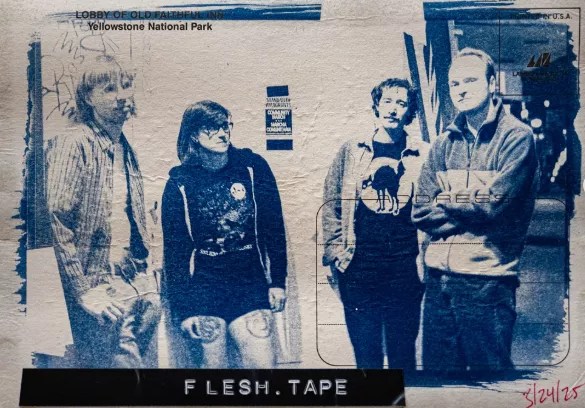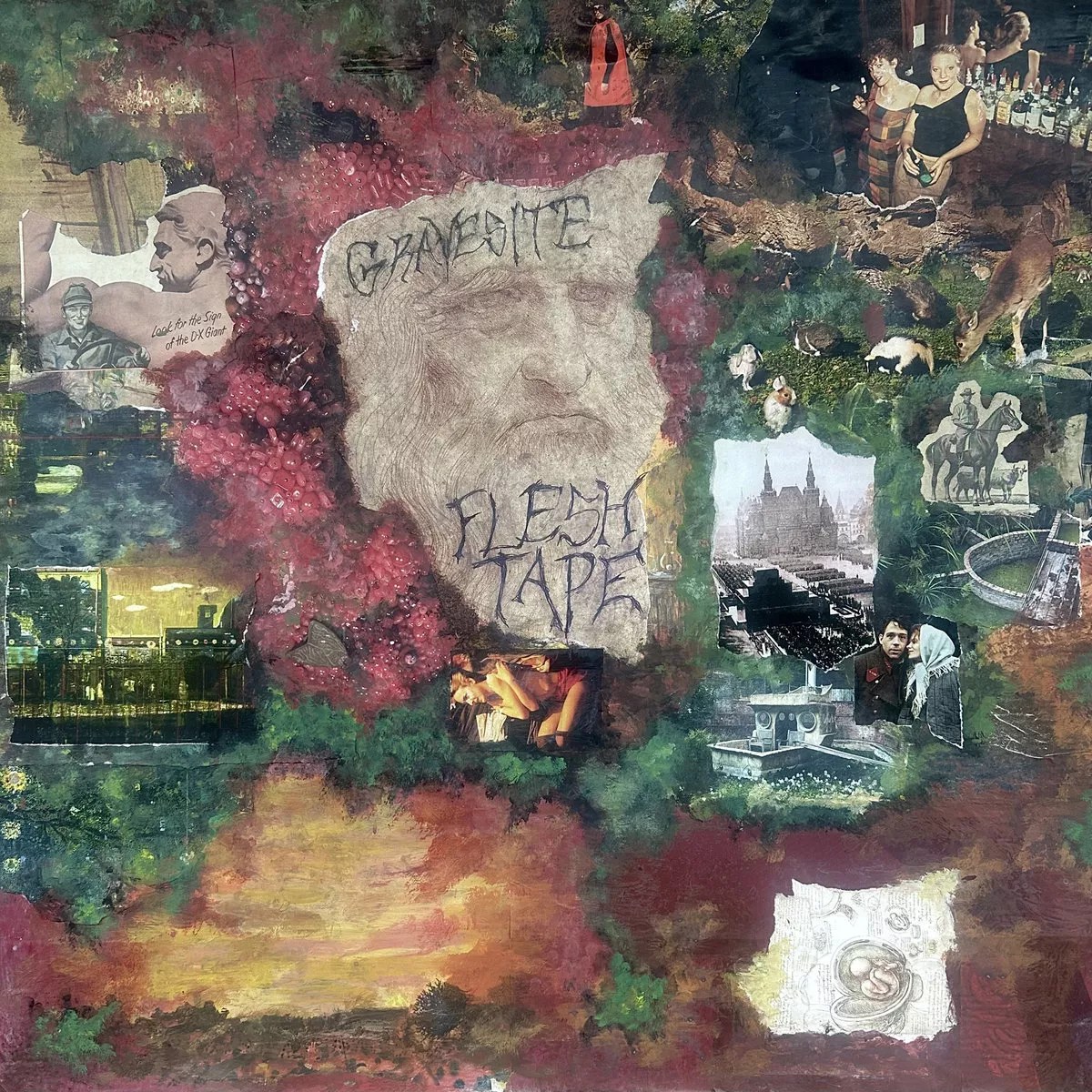
Jacob Juno (@chippedbasket)

Audio By Carbonatix
For most bands, simply creating art and performing it in front of an audience is enough of a goal on its own. But for Flesh Tape frontman Larson Ross, the music serves as an important opportunity to build larger movements around class consciousness, labor struggles and pushing back on the war machine. These are at the forefront of the band’s blistering new three-track EP, Gravesite.
Released this week on Denver DIY label Power Goth Recordings, Gravesite features many of the stylings of modern punk, shoegaze and alt-rock. The release boasts noisy, wailing guitars, dynamic, fast-paced drumming, and a wholly confrontational response to standing over the edge of apparent capitalistic doom. In a sense, the only way out is through, no matter how evident the horrors may be and how big the call of the task.

The cover of Flesh Tape’s new three-track EP Gravesite, released this week on Power Goth Recordings.
Artwork by Evelyn Zamba
Made up of vocalist-guitarist Ross, fellow guitarist Walker Urban (The Red Scare), bassist Anders Dahl (Ampule), and drummer Lauren Beecher (Broken Record; Power Goth Recordings), the band cemented its place as a staple in the Colorado rock scene with its debut self-titled LP last year. Gravesite marks the first time Flesh Tape has recorded as a four-piece lineup, resulting in an amalgamation of gazing guitar textures and unrelenting power across eight minutes.
Ross says that “Ripoff” and “Band Time” touch on labor in Los Angeles and Pueblo, the former on the effects of industrialization on workers, and the latter on a steel mill that formerly employed most of the Southern Colorado town. While these industrial work sites were also hotbeds of the working class gaining class consciousness, and “the realization [workers] could fight for a better world,” he worries that the concept of “the cause” echoed on both tracks could be “lost and mean nothing to the people in the post-industrial strip-mall waste that we find ourselves in” without the sites.
“Shame the name didn’t last, the cause burned out of his flesh and dragged, flown out to a gravesite in LA,” he sings on “Ripoff.”
“I attest, the cause is all we have left,” Ross adds on “Band Time.”
“The cable car is hanging there, stranded over nothing but air.”
Ross says these echoed refrains about “the cause” signal not just the power of organizing, but also the horrors, hopelessness and necessary adaptability involved in facing the seemingly impossible task of shifting the status quo. He describes “the cause” as just as much of a curse as it is a reason for existing, emphasizing the urgency in either case.
“How can any one person measure up to the historical task of fighting climate change, fighting for a good quality of life for all people, and fighting against the genocidaires that are happy to kill off entire peoples and the planet for their own profits, their millenarian visions, and their control?” he poses. “No one person can do anything on their own, which necessitates organizing, but in those low moments of despair, I’m not in love with the cause – I have no other choice than to pursue it. Organizing isn’t always power and joy.”
The EP was recorded at Band Cave Studios, was mixed by engineer Collin Ingram, and was co-produced by Ingram and Beecher. Ross called Ingram a “joy” to work with, noting that he provided a lot of important insight into the recording process. He says Ingram also happened to be the only recording engineer in Colorado followed on social media by Governor Jared Polis, which Ross half-jokingly says he thought could be useful to give him a foot in the door to influence the governor.
“I think I could have gotten him to not veto all the incredibly popular shit he keeps vetoing,” the songwriter says.
Ross notes that the EP’s final track, “False Desire,” is more personal than most of the songs he writes, questioning first and second-order desires and what it means to come to terms with them. He says the song touches on “the instinct to like crawl away, to pursue pleasure even if it means hurting other people,” along with how we actually decide to act and interact with our urges as humans.
“Despite being pretty internally facing,” he says, “I think that wrestling with those questions actually has a lot to do with collective action: Are we acting for acting’s sake or are we building a real structure to challenge the powers that be?”
Over a beer at Surfside 7, Ross tells Westord more about how he got into radical politics and its influence on his music, along with sharing how he balances this – or sometimes doesn’t, perhaps to the detriment of his own mental health – in his own writing. Dipping in and out of these themes is something he admired about bands like Sonic Youth, and today it informs his desire for shows and bands to represent a more collective action-focused scene, rather than just playing songs at a captive, albeit passive, audience.
“A lot of the bands that I admired were deeply political, but not always,” Ross explains. “It’s why I gravitated towards bands like Sonic Youth, which, for me, meshed a radical sensibility in the kind of music you make with politics here on the edges of things. Like, they have a few openly political songs, but a lot of it was more subtle or was based around the crafting of the art itself, or the art as, if not a political statement, then a radical statement.”
Gravesite is available to purchase on Bandcamp and stream on all platforms.